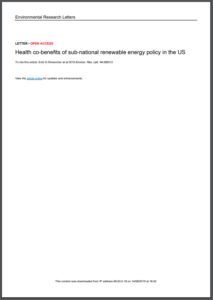Full Title: Health Co-Benefits of Sub-National Renewable Energy Policy in the US
Author(s): Emil G Dimanchev , Sergey Paltsev , Mei Yuan , Daniel Rothenberg , Christopher W Tessum , Julian D Marshall, and Noelle E Selin
Publisher(s): Environmental Research Letters
Publication Date: August 12, 2019
Full Text: Download Resource
Description (excerpt):
State and local policy-makers in the US have shown interest in transitioning electricity systems toward renewable energy sources and in mitigating harmful air pollution. However, the extent to which subnational renewable energy policies can improve air quality remains unclear. To investigate this issue, we develop a systemic modeling framework that combines economic and air pollution models to assess the projected sub-national impacts of Renewable Portfolio Standards(RPSs) on air quality and human health, as well as on the economy and on climate change. We contribute to existing RPS cost benefit literature by providing a comprehensive assessment of economic costs and estimating economy-wide changes in emissions and their impacts, using a general equilibrium modeling approach. This study is also the first to our knowledge to directly compare the health co-benefits of RPSs to those of carbon pricing. We estimate that existing RPSs in the ‘Rust Belt’region generate a health co-benefit of $94 per ton CO2 reduced ($2-477/tCO2)in 2030, or 8¢ for each kWh of renewable energy deployed (0.2–40¢ kWh−1)in 2015 dollars. Our central estimate is 34% larger than total policy costs. We estimate that the central marginal benefit of raising renewable energy requirements exceeds the marginal cost, suggesting that strengthening RPSs increases net societal benefits. We also calculate that carbon pricing delivers health co-benefits of $211/tCO2 in 2030, 63% greater than the health cobenefit of reducing the same amount of CO2 through an RPS approach.
